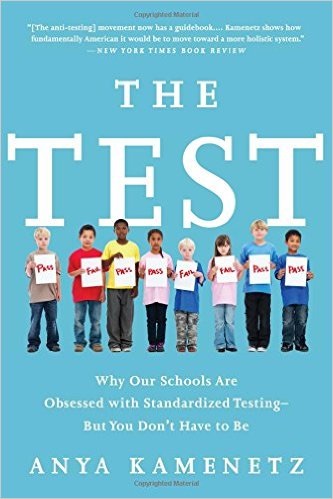The Test: Why Our Schools Are Obsessed with Standardized Testing – But You Don’t Have to Be by Anya Kamenetz explains in some detail the ten things wrong with state tests along with some history and politics. She goes on to tell educators and parents what they should do to help kids survive the madness. Anyone who dislikes state test should get this book.

Introduction
- Anya starts with the premise that high-stakes tests are stunting children’s spirits, adding stress to family life, demoralizing teachers, undermining schools, paralyzing the education debate, and gutting our country’s future competitiveness. She also cites Campbell’s law which can be stated as “when a measure becomes a target, it ceases to be a good measure.” You give people a number and they will work towards it to the detriment of all other measures of success. They also harm the poor, minority, and English language learners they were designed to help as people with means look to purchase homes that are served by schools with high test scores. This book starts by defining the problem and ends with solutions as to what we need do of fix it.
1. Ten Arguments Against Testing
- 1. We are testing the wrong things. They mostly test the application of memorized routines to familiar problems in only two subjects. Novel situations that require thinking aren’t covered. There are lots of important things they don’t test.
- 2. Tests waste time and money. The tests along with test prep, practice tests, and field tests eat up tons of time. This doesn’t count testing imposed by school districts and tests given by teachers for grades and to direct instruction. Kids who struggle usually get more of this in addition to extra time to take the tests. The costs add up.
- 3. They are making kids hate school and turning parents into preppers. The process is boring and putting teachers’ and principals’ jobs on the line adds to needless stress. For some, the anxiety depresses performance. Rich parents pay for prep test classes and home quality time is sacrificed for parent-directed test prep.
- 4. They are making teachers hate teaching. Outside authorities have the final say on how teachers do their job. For many states, teacher evaluations and tenure depend on test scores. Research shows that ratings for individual teachers are highly unstable, varying from year to year and one test to another. Retirement and attrition rates have increased and job satisfaction has plummeted.
- 5. They penalize diversity. Poor and minority kids fail more and their schools are often punished or closed. Schools with higher rates of students with disabilities are in the same boat. To increase percent proficient scores, some teachers focus attention on students near the proficiency line. It’s clear that standardization is the enemy of diversity.
- 6. They cause teaching to the test. NCLB testing focuses on easily tested portions of reading and math skills. Therefore, teachers will arranges their teaching to place an undue focus on what can be tested. Studies indicate that as a result, teachers spend more time talking while students sit, listen, and don’t think much.
- 7. The High Stakes Temp Cheating. There is no doubt that a good deal of cheating has taken place since the tests were introduced, and schools more likely to cheat are schools with poor scores that tend to have poor and minority students. There are also reports of students cheating on SAT exams.
- 8. They Are Gamed By States Until They Become Meaningless. NCLB allowed every state to create its own assessment regime, cutoff scores, and progress measures. Since the states are the customers, testing companies give them what they want. Furthermore, it’s people working for the states that make the cutoff decisions. When political leaders set educational standards, they tend to act with political motivation. In short, there is no accountability.
- 9. They Are Full of Errors. There is no doubt that many state tests contain questions with ambiguous or wrong answers. This is probably due to the fact that people hired to write and grade tests are low paid ($15/hour) and not required to have relevant degrees or experience in education. They are also likely to be temporary workers. Even the SAT has made the essay portion optional as the scores didn’t predict grades or success in college.
- 10. The Next Generation of Tests Will Make Things Even Worse. With the introduction of the Common Core Standards comes tests with higher difficulty and fewer testing options. New tests will use computers for administration, which means the school’s computers will be tied up for long periods doing testing as opposed to supporting student projects. They will still test limited subjects in limited ways, be error prone, coachable, and likely to distort the curriculum.
DrDougGreen.com If you like the summary, buy the book





